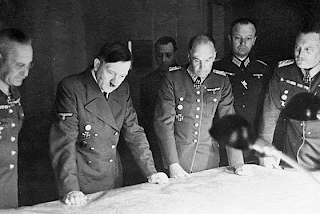
By all accounts, Nazi Germany made serious errors in waging the Second World War that kept it from achieving much greater success, though whether it could have won the War remains open to doubt, given the American effort to develop nuclear weapons. Also, Japanese mistakes need to be taken into consideration. At any rate, asking “What if” questions about German strategy can help us better understand what actually happened.
Here is a list of key German mistakes that can guide our thinking about the many lessons we can learn from this greatest of wars (not included are significant errors at the battlefield level such as at Dunkirk and Stalingrad). Of course, this list assumes that Germany’s decision to go to war in the first place and with the goals it had for doing so made sense. I thank my students for their contributions to the list.
Tags: Adolf Hitler, Axis, Battle of Britain, Eastern Front, Holocaust, japanese strategy, Mussolini, Nazi Germany, prisoners of war, Second World War, war mobilization, Wehrmacht, World War II
 Many Germans have earnestly sought to overcome the Nazi past by publicizing its depredations, by acknowledging wrongdoing, by seeking restitution of stolen property, and by maintaining a respectful, responsive stance toward Jews in general and Israel in particular. Still, such is the burden of the Holocaust that another approach may also prove attractive to certain Germans. It involves Yiddish.
Many Germans have earnestly sought to overcome the Nazi past by publicizing its depredations, by acknowledging wrongdoing, by seeking restitution of stolen property, and by maintaining a respectful, responsive stance toward Jews in general and Israel in particular. Still, such is the burden of the Holocaust that another approach may also prove attractive to certain Germans. It involves Yiddish.
While Yiddish contains elements of Hebrew and Slavic languages, it is mainly an old dialect of German. A German speaker can understand most of it, and in fact Yiddish forms part of the study of German linguistics and literature, correctly understood. This means that a simple initiative could help bring Germans and Jews closer.
Tags: German language, Germans, Germany, Holocaust, Israel, Jews, linguistics, overcoming the past, Yiddish


 Many Germans have earnestly sought to overcome the Nazi past by publicizing its depredations, by acknowledging wrongdoing, by seeking restitution of stolen property, and by maintaining a respectful, responsive stance toward Jews in general and Israel in particular. Still, such is the burden of the Holocaust that another approach may also prove attractive to certain Germans. It involves Yiddish.
Many Germans have earnestly sought to overcome the Nazi past by publicizing its depredations, by acknowledging wrongdoing, by seeking restitution of stolen property, and by maintaining a respectful, responsive stance toward Jews in general and Israel in particular. Still, such is the burden of the Holocaust that another approach may also prove attractive to certain Germans. It involves Yiddish.